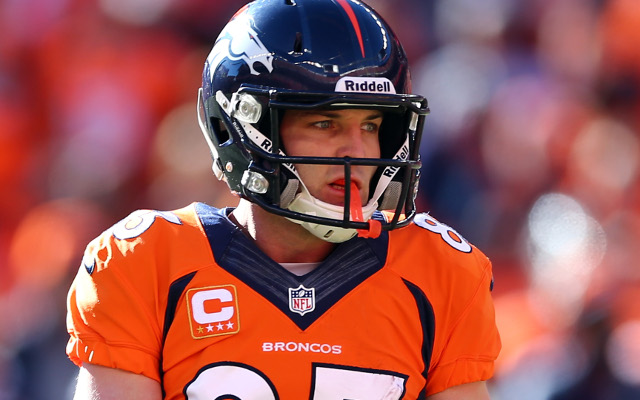Star wide receiver fans the flames of debate regarding head injuries in the NFL.
Denver Broncos receiver Wes Welker says he would play in Super Bowl XLVIII even with a concussion because achieving his dream of a National Football League title is that important.
Welker enters Sunday’s Super Bowl 48 against Seattle knowing both situations very well, having missed the Broncos’ last three games of the season with a concussion and lost his two prior Super Bowls while playing for New England.
“You want to be out there,” Welker said in comments that are likely to infuriate health campaigners. “The Super Bowl, this is what you dream about. You’re going to be there. I don’t care what it takes, you’re going to be out there in this game.”
Concussions have become a major concern of the NFL in recent years, with new rules against hitting foes with helmets and a federal judge saying the NFL’s $765 million settlement offer to former players for long-term health injuries might not be nearly large enough.
New mental acuity tests for players suspected of having concussions are in the rules, limiting a player’s chances of returning to the game after a serious head injury or faking his way back onto the field as healthy during a game.
“I think they do a good job of the protocols and different things like that these days,” Welker said.
“But we’re football players. We’re competitors and you want to be out there playing. You want to be out there on the field and giving your best for your team.
“It’s kind of a tough issue sometimes and you just go out there and deal with it and try to keep yourself safe, but at the same time, given the chance to go compete, you go compete.”
NFL vice president Jeff Miller, who announced this season saw a 13 percent drop in the number of concussions from a year earlier, said Welker needs to consider the long-term impact of head impacts, especially with a concussion.
“I would hope he would understand the importance of diagnosis for his health over time,” Miller said.
Welker knows first-hand the risks involved.
“They are scary deals,” he said. “I have friends I’ve played with who tell me they have issues with it now. It’s one of those things you have to deal with and try to make the best decision for yourself.”
Far from forgetting due to a brain injury, Welker is haunted by the memory of a dropped fourth-quarter pass in the 2012 Super Bowl.
“It motivates you during the offseason. It motivates you when you’re working out, it motivates you through the year,” Welker said. “Just that feeling of losing that game is heartbreaking. It definitely sticks with you and motivates you for the future.”
Welker, 32, is in his 10th NFL season. He caught 73 passes for 778 yards and 10 touchdowns as part of an offense that set NFL records for passing yards and touchdowns and points scored in a season.
After sitting out due to concussion for three games in December, Welker returned for two playoff wins wearing a special extra-protective helmet.
“I’ve gotten a lot of texts and emails about my big helmet and how ridiculous I look in it, but as long as I’m out there playing, I’m all good,” he said.
While he hopes to avoid the toughest blows from a Seattle defense known for hard hitting, Welker knows his job is to take the punishment and gain yardage.
“You try not to take those big hits, but you have to make sure you are getting first downs,” Welker said. “You have to help your team move the ball.”

COMMENTS